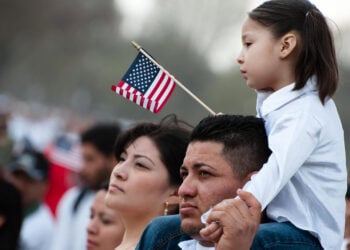In 2019, no aspect of our country’s immigration system escaped profound change. The upheaval left children separated from their parents, businesses without employees, farmers with crops rotting in the fields, international students stranded, and refugees living in squalid conditions. No American has been left untouched by immigration policy in 2019.
DELAYS BUILD INVISIBLE WALL
Processing delays are the bricks in this administration’s construction of an invisible wall – the deliberate process of restricting and slowing the pace of legal immigration. In 2018, United States Citizenship and Immigration Services (USCIS) processed benefit applications 19% slower, even though volume decreased 17%. Over the last two years, average wait times have increased 46%, growing the case backlog to over 2.4 million – more than a 100% increase from 2016.
H1B VISA HOLDERS DENIALS
H1Bs are a minefield of new restrictive policies resulting in more denials. The denial rate for new H1Bs has risen to 24%, an increase of 14% since 2017. For H1B extensions, the denial rate has jumped from 5% to 12%. In 2020, the administration has signaled its intent to rescind work authorization for H1B spouses, further narrow the definition of specialty occupation, and revise the definition of the employer-employee relationship creating more barriers for North Carolina’s roughly 19,000 H1B visa holders and their employers.
DREAMS DEFERRED
Over 700,000 Deferred Action for Childhood Arrivals (DACA) recipients await the SCOTUS decision on whether the Trump administration lawfully terminated the program. If ended, we stand to lose $5.7 billion in tax revenue. In 2016, North Carolina’s 25,000 DACA recipients paid $63.6M in state and local taxes and filled vital roles.
Similarly, Temporary Protected Status (TPS) provides a lifeline for more than 400,000 nationwide. North Carolina is home to more than 15,000 TPS holders who contribute more than $570M to the economy. The current administration terminated TPS for 6 of the 10 countries in the last two years but final implementation has been enjoined pending litigation.
In 2019, there was a 13.7% decline in international student applications to business schools in the United States. It was also the third straight year of decline for new international students in American universities. The number of student visas issued at U.S. consulates decreased almost 50% between 2014 and 2018. Increased scrutiny on students’ home country ties, shortened visas for Chinese nationals, and increased vetting has stranded students from a few weeks to a few months without warning.
About 22,000 international students call North Carolina home. They generate more than $722M and support 9,000 jobs. In 2020, the administration looks to revisit the Optional Practical Training (OPT) program that allows students to work in their field postgraduation and limit the time students can spend in the United States. There is also pending litigation against the administration regarding how lawful presence is recognized while studying in the United States.
PAY TO PLAY
USCIS is proposing fee increases for almost all applications with some almost doubling. Also proposed are new fees for employment-based petitions, such as H1Bs, and a change to the premium processing response time from 15 calendar days to 15 business days. Other changes include new fees for DACA recipients and asylum applicants, and significantly increased fees based on spousal or parent petitions.
DISFUNCTION FOR THE DISENFRANCHISED
No immigrants have experienced greater mayhem than refugees and asylees. Under this administration, the annual number of refugee admissions has fallen from 84,994 in 2016 to 22,491 in 2018 with a cap of only 18,000 set for 2020. Suspension of the entire refugee admissions process and executive orders have made resettling refugees almost impossible.
In 2018, 65% of all asylum applications were denied and the AG has narrowed the types of qualifying persecution by referring cases to himself and reversing decades of precedent. The administration also implemented the “remain in Mexico policy” that forces asylees to remain in Mexico for their court date. More than 60,000 migrants camp by the border without access to plumbing or electricity, much less legal representation.
PROTECT DUE PROCESS
Immigration cases are being litigated at all levels of the federal courts including the U.S. Supreme Court. Injunctions and temporary restraining orders have been issued to halt numerous administrative actions. It is anticipated that 2020 will bring more of the same. Nam Douglass










